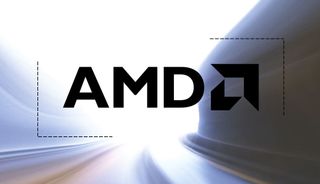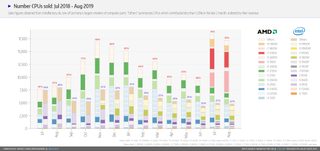Ryzen 3000 Doubled AMD's CPU Sales and Revenue at German Retailer

Mindfactory.de is one of Germany's most popular PC hardware retailers, and while its CPU sales data is not representative of the sales mix for the whole world, it does give us insights into shifts in the CPU market, such as whether or not Intel or AMD are growing or shrinking and what the most popular CPUs from each vendor are.
Recent data from Mindfactory shows that AMD's most recent Ryzen 3000 series, released on July 7th, has made AMD by far the superior CPU seller at the German retailer: both AMD's sales and overall revenue doubled in July compared to June.

Though AMD has long been selling more CPUs than Intel on Mindfactory, AMD's lower pricing translated into the company only making about as much money as Intel. But when Ryzen 3000 finally launched, AMD went from selling 68% of all CPUs and making as much revenue as Intel in June to selling 79% of all CPUs and making three times as much revenue as Intel in July. This is possible thanks to high demand for Ryzen 3000 (which represented over half of the CPUs AMD sold at the vendor in July), and to Ryzen 3000's much higher price tag compared to the previous-gen 2000 series.
Ryzen 3000 doesn't seem to have impacted demand for Intel CPUs, or even the previous-gen Ryzen 2000 series, however. Instead, it seems that Ryzen 3000 attracted consumers who weren't interested in buying either Ryzen 2000 or Intel's 8th- or 9th-gen processors. Mindfactory's overall sales both in terms of units and cash have increased dramatically since July.
Sales and revenue did decline significantly from July to August, but AMD is still the clear winner for both units sold and revenue, almost entirely thanks to Ryzen 3000 even though the older 2000-series still composes a significant chunk of AMD's sales and revenue. Considering there have been noticeable shortages of both the 3700X and the 3900X (the first and third most popular Ryzen 3000 CPUs respectively), it's possible there is still more demand than AMD has been able to meet.
Stay on the Cutting Edge
Join the experts who read Tom's Hardware for the inside track on enthusiast PC tech news — and have for over 25 years. We'll send breaking news and in-depth reviews of CPUs, GPUs, AI, maker hardware and more straight to your inbox.
Matthew Connatser is a freelancing writer for Tom's Hardware US. He writes articles about CPUs, GPUs, SSDs, and computers in general.
-
Co BIY I suspect there is pent up demand that has been waiting for Intel's 10nm entry into the desktop. If 10nm desktop is a lateral move to current 14nm offering's then I see AMD getting another boost.Reply
Most Popular




